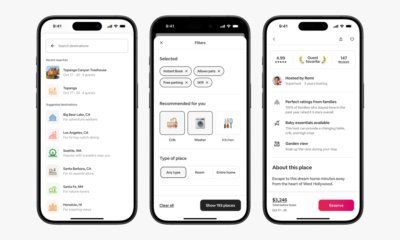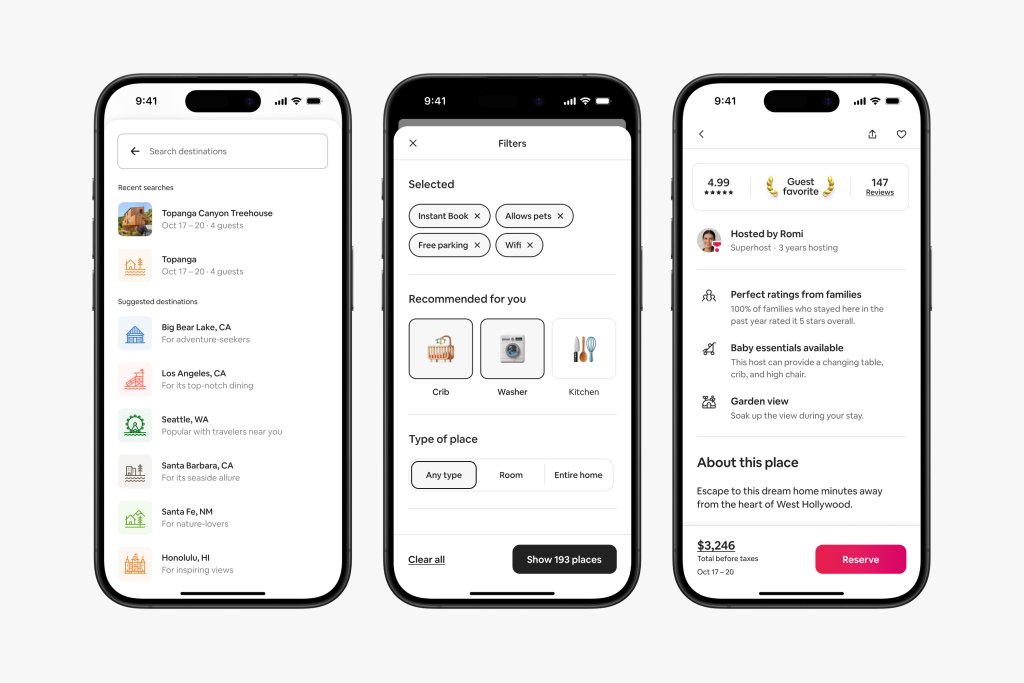Airbnb is preparing to rebuild its internal search engine with generative AI at the core. In a recent job posting for a search infrastructure engineer, the company outlined plans for a “next generation search platform” designed to support “generative AI (large language model) use cases.”
Candidates with expertise in search and recommendation systems are encouraged to apply, and experience with GenAI or LLMs is listed as a preferred qualification.
Search is one of the most critical components of Airbnb’s business. It determines how guests discover homes and experiences, and how hosts reach customers. And while Airbnb has not made any public announcements about an AI-native search product, the technical scope and job description point to ambitions beyond incremental improvements.
The listing suggests Airbnb is looking to reconstruct its core search product to accommodate AI. The new platform is described as one that will “power different products at Airbnb,” suggesting that generative AI could become a foundational layer across the company’s marketplace.
In response to a request for comment, an Airbnb spokesperson said the company is “always working to enhance the overall Airbnb experience” and is “actively seeking talented individuals who share our mission to transform the way people travel.”
Give Me a Room With a View
If Airbnb succeeds in launching a functional AI-powered search system, the move could change how travelers interact with the platform. Traditional travel search engines rely on structured inputs: location, dates, price filters, and a fixed set of amenities. Generative AI has the potential to interpret natural language queries, understand user context, and return relevant results with fewer steps and less manual sorting.
For example, instead of filtering by location and bedroom count, a guest might enter a query such as “a quiet place in the mountains with fast Wi-Fi, a hot tub, and a view” – and receive listings that match even if the keywords don’t align exactly.
Several other travel companies have begun integrating AI tools into their platforms, including chat-based trip planning assistants and personalization features.
When Data is King
But Airbnb may be in a stronger position than some of its competitors to make that shift. The company has access to a large volume of structured and unstructured data: millions of listings with detailed attributes, user-generated reviews, booking behavior, search history, and messaging between hosts and guests. This data could support the training or fine-tuning of models capable of delivering more personalized and accurate search outcomes.
Airbnb also owns its entire supply-side platform. Unlike online travel agencies that depend on inventory from third-party providers and hotel chains, Airbnb’s listings are user-generated and directly managed on its system. That vertical integration provides a cleaner dataset and more flexibility in how results are ranked and surfaced, key advantages for any machine learning application.
The introduction of a new AI-native search system could also create competitive pressure in the broader travel sector. Google, Booking Holdings, and Expedia Group have all made recent announcements about generative AI experiments, including itinerary generation and trip planning tools.
Airbnb CEO Brian Chesky has previously hinted at AI’s potential role in product discovery, referring in past earnings calls to a vision of Airbnb as a kind of intelligent travel concierge. A generative AI system could take that vision further, allowing for contextual, conversational discovery that adapts to different user intents in real time.
The company has not disclosed what timeline it is working toward, what specific models it may be using, or whether it intends to partner with external AI vendors or develop proprietary solutions. The job posting does not mention OpenAI, Anthropic, Google, or any of the major LLM providers by name.
Beyond the Short-Term Rental
What if Airbnb is thinking bigger than site search? There’s a huge world of travel beyond short-term rental listings and its new experiences product.
Airbnb’s focus on design and its ability to attract talent put it in a position to compete in ways that other travel brands can’t.
Chesky also has a strong relationship with Sam Altman, CEO of OpenAI. They’ve known each other since the 2000s, first at Y Combinator, the startup accelerator. And Altman has talked about the counsel Chesky gave him at OpenAI.
Airbnb has always had ambitions beyond booking a room, and the focus on AI search will help it compete against players like Expedia when it comes to airline search or any other part of the travel journey.
Very Online is your best source for news about online travel, from startups to the biggest online travel agencies.
Get it in your inbox every Wednesday.
By submitting this form, you agree to receive email communication from Skift.



































You must be logged in to post a comment Login